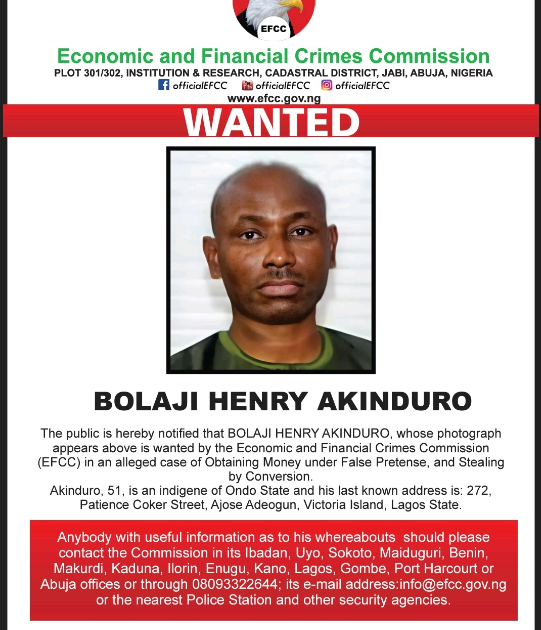On Saturday, the Economic and Financial Crimes Commission (EFCC) announced that Bolaji Akinduro, the Executive Chairman of Total Grace Oil and Gas Investment Limited, is now considered a wanted individual due to allegations of fraud. The statement released on the EFCC’s official X.com account detailed the nature of the allegations against Akinduro, indicating he is implicated in cases of obtaining money under false pretenses and stealing by conversion. This escalation of the investigation highlights the ongoing efforts by the EFCC to combat financial crimes within Nigeria, demonstrating their commitment to enforcing the law and protecting economic integrity.
The EFCC’s statement further elaborated on Akinduro’s profile, stating that he is 51 years old and a native of Ondo State. His last known residence was reported as 272 Patience Coker Street, Ajose Adeogun, Victoria Island, Lagos State. The agency’s approach not only aims to locate Akinduro but also seeks to engage the public in this effort, encouraging citizens to report any information regarding his whereabouts. This public call illustrates the EFCC’s strategy of collective involvement in tackling financial crimes, empowering citizens to take a part in law enforcement and enhancing the visibility of anti-corruption campaigns.
In their announcement, the EFCC emphasized that anyone who might have information can reach out to them through various regional offices or contact them directly via a specified phone number or email. The breadth of contact options reflects the EFCC’s accessibility and determination to gather intel on Akinduro. This measure is crucial in addressing financial crimes, as it facilitates community engagement and collaboration between the agency and the public, potentially leading to quicker resolutions of cases involving suspected fraudsters.
The EFCC’s actions are not without precedent, as Akinduro has previously encountered serious legal troubles. Notably, in April 2001, he, along with his company, His Grace Integrated Solution Limited, and two other individuals, was arraigned before Justice Funmilayo Akinlade of the Lagos High Court, Ikeja. The charges from that earlier court case included forgery, stealing, and conspiracy, indicating a long history of legal issues surrounding Akinduro and affiliated businesses. This pattern raises questions regarding accountability and governance within the business frameworks he has operated, shedding light on the challenges posed by white-collar crime in Nigeria.
The ongoing developments surrounding Akinduro and actions taken by the EFCC are emblematic of broader systemic issues within Nigeria’s economic landscape. The prevalence of economic and financial crimes often undermines public trust in institutions, stifling economic growth and deterring investment. The EFCC’s rigorous pursuit of individuals suspect of such crimes plays a vital role in restoring faith in financial systems and ensuring that law and order prevail in the business environment. It is critical for Nigeria to address these challenges effectively to improve its image and cultivate a more robust economic climate.
In conclusion, the EFCC’s declaration of Bolaji Akinduro as wanted for alleged fraud signifies an ongoing battle against economic crimes in Nigeria. By continuing to pursue accountability and transparency, the agency seeks to reinforce the legal and ethical standards expected of business leaders. As this case unfolds, it will likely have implications not just for Akinduro and his associates but also for the broader context of economic governance in Nigeria, emphasizing the importance of vigilance and community participation in the fight against corruption.


